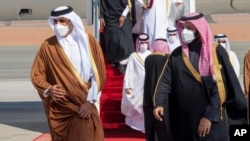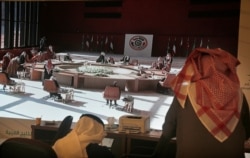The Gulf Cooperation Council held its 41st annual summit outside the Saudi capital Riyadh Tuesday, amid optimism over the apparent resolution of a long-standing conflict with Qatar. Riyadh has agreed to reopen its land, air and sea borders with Doha.
Qatari TV showed the country's leader Sheikh Tamim bin Hamid Al Thani being met at the airport in Riyadh and embraced by long-time adversary Crown Prince Mohammed Bin Salman in the lead-up to Tuesday's Gulf Cooperation Summit in the Saudi province of Al-Ula.
The Saudi crown prince, who chaired the summit, thanked allies and friends of the kingdom for mediating with Qatar over many months to bring about the resumption of relations at the Tuesday summit.
He said that he thanks the late emir of Kuwait, Sheikh Sabah al-Ahmad al-Sabah, and the current emir, Sheikh Nawaf al-Ahmad al-Sabah, as well as allies like the United States for mediating the Al-Ula Agreement [with Qatar] that is now being signed to forge stability and solidarity in the Gulf.
Saudi Arabia reopened its land, sea and air borders with Qatar as a result of the agreement and Arab media showed the reopened border checkpoint between the two countries. It did not appear, however, that much, if any, traffic was moving in either direction. Up to 800 trucks, carrying food and other supplies, normally go through the crossing every day.
Qatari analyst Majid al Ansari told the country's Al Jazeera TV (Arabic) that he "does not think there has been any resolution of most demands made on Qatar by any of the four countries which closed their borders to Doha in 2017, but that conflict management would address the outstanding grievances."
Saudi Arabia, Egypt, Bahrain, and the United Arab Emirates closed their borders to Qatar in 2017 over the country's alleged support of terrorist groups, hostile media campaigns against them by Al Jazeera TV, support for the Muslim Brotherhood group and the emirate's ties with Iran.
Egyptian political sociologist Said Sadek said "neither Egypt nor the UAE are pleased about the normalization with Qatar, since none of the irritants with Doha have been resolved."
"Egypt had no other option but to coordinate what is to be done. They went along [with the decision] but with the following understanding: because Qatar did not deliver, Sissi refused to attend the summit and sent his Foreign Minister [Smeh] Shoukri," said Sadek.
Washington-based Gulf analyst Theodore Karasik said the Trump Administration "pushed all sides to reopen because it's critical for regional rejuvenation due to the COVID-19 [crisis]."
Saudi Arabia, he added, "offers ports to help export or import for Qatar, but the scope is bigger because it involves dealing with Iran and Turkey." "And, in the background," he argued, "is the normalization process between the UAE and Israel."
Paul Sullivan, a professor at Washington-based National Defense University, said it was just "a matter of time [before] the GCC countries would find some accommodation for Qatar to rejoin," but that it may also "be a matter of time before past tensions resurface," including allegations of Qatar's support for terrorism, relations with the Muslim Brotherhood---which the Saudis and Emiratis consider a threat---and Doha's cordial ties with Iran.












